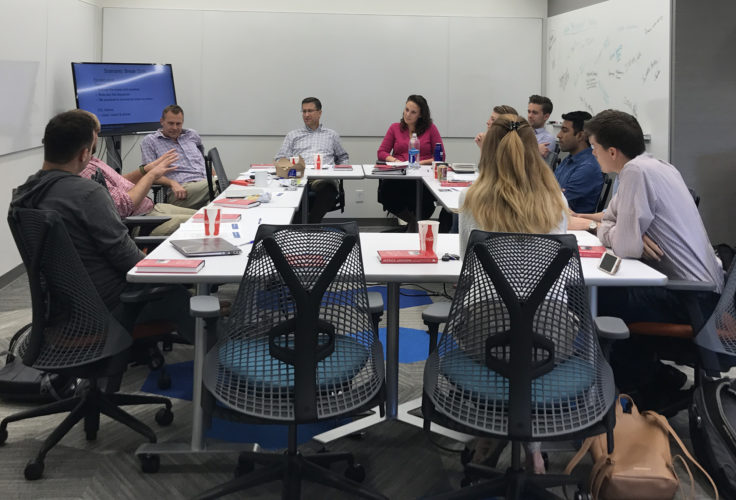Business owners trying to keep the lights on likely place “instilling culture” among their lower priorities (that is, if it makes the “priority list” at all). Articulating the values of a company often comes second to growing the business—but largely, that is a false choice. Identifying which values to build your company upon is an integral part of determining the company’s mission, goals, and overall strategy.
An upcoming panel discussion, “The Value of Values for Founders and Entrepreneurs,” explores the challenges businesses face when articulating their values. I asked Stuart Bunderson, George & Carol Bauer Professor of Organizational Ethics & Governance and co-director of the Bauer Leadership Center, and the panel’s moderator, Cliff Holekamp, senior lecturer in entrepreneurship and director of the entrepreneurship platform, to shed light on why crafting values and a strong culture is critical to success.
Why is it important to articulate core values in the early stages of a venture?
Holekamp: While in the early stage, young ventures are evolving and still figuring out who they’re going to be when they grow up. It’s at this formative time when a leader has the most impact on instilling the values that will become part of company culture for years to come. If you aren’t purposeful about the values and culture of your early-stage venture, then you’ll end up with a later-stage venture whose values and culture are accidental.
Bunderson: In the earliest stages of a new business, every decision can set a precedent and become a statement on what the organization values and aspires to become. Those decisions should therefore be made with a clear sense of the values that founders would like their organization to embody.
What challenges do founders face in articulating and instilling these values?
Holekamp: Perhaps the biggest challenge is to remain authentic to yourself and to your business. There are lots of positive values in this world, but as a founder you need to emphasize those that are true to who you are. As a leader, you are influencing your business and its constituents with every unintended word and action. If you choose a company culture that is an honest extension of your own best self, then it will be much easier, and more likely, that your business will be consistently infused with those values.
Bunderson: Pressures to chase funding or make near-term performance goals can lead founders to compromise on values. When founders cling to their core values in spite of those pressures, those values become part of the organization’s fabric.
What role do entrepreneurial values play in family firms that may not be the case in corporate firms?
Bunderson: Family firms may explicitly pursue values that corporations would not, values related to things like promoting the family’s good name and broader impact, providing learning opportunities for family members, or encouraging family members’ self-reliance.
Why should founders prioritize values and culture?
Holekamp: Both employees and customers want to be a part of something that is greater than a mere transaction of money for goods or services. A company that honestly conveys values offers something more than those that don’t.
Bunderson: Founders should prioritize values for two reasons. Core values that are woven into the fabric of the company can be a key source of competitive advantage that is not easily replicated. But perhaps just as importantly, if not more importantly, many founders want to create a company that stands for something besides just profitability.
What do you hope business leaders take away from the upcoming panel discussion?
Holekamp: Entrepreneurs and small business owners have the special opportunity to leverage their own personal values as a strategic advantage in business—a competitive advantage that their corporate rivals should envy. My hope is that more entrepreneurs recognize this, and leverage it to their own business and personal advantage.
Bunderson: A reminder of why values should be top of mind as they work to create a new venture.
About Stuart Bunderson & Cliff Holekamp

Professor Bunderson is the co-director of the Bauer Leadership Center and the George and Carol Bauer Professor of Organizational Ethics and Governance. He is also an honorary professor with the faculty of economics and business at the University of Groningen in The Netherlands. He holds a PhD degree in Strategic Management and Organization from the University of Minnesota and BS and MS degrees from Brigham Young University. His award-winning research on issues of leadership and meaningful work has been published in leading management journals.

Cliff Holekamp grew up in Los Angeles and worked as an account executive for IBM in Nashville before coming to Olin, first as a student. After developing the concept in Olin’s entrepreneurship program, he founded a chain of healthcare centers which he later sold to a private equity group. Prof. Holekamp was the founding director of the Entrepreneurship Platform, was the co-founder and architect of the social entrepreneurship programs at Olin and at the Brown School of Social Work, and has launched several new entrepreneurship courses including programs in Hungary and Israel. In addition to teaching, he is a co-founder and general partner at Cultivation Capital, an early stage venture capital firm.








